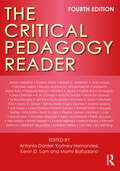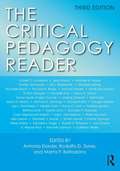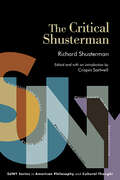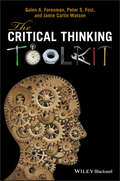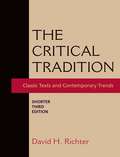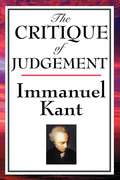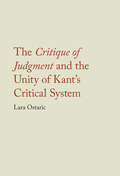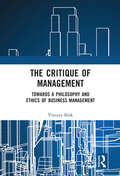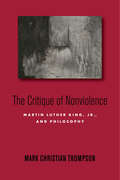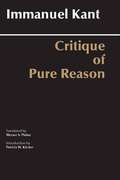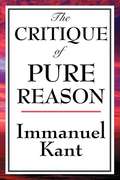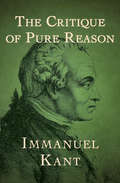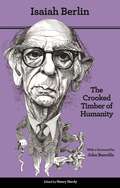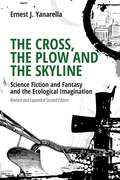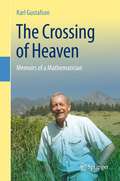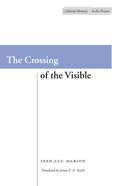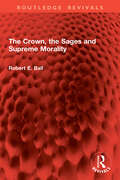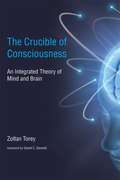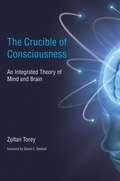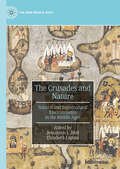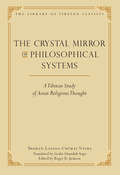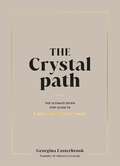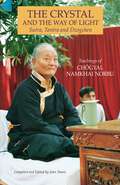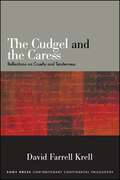- Table View
- List View
The Critical Pedagogy Reader
by Antonia Darder Kortney Hernandez Kevin D. Lam Marta BaltodanoSince its publication, The Critical Pedagogy Reader has firmly established itself as the leading collection of classic and contemporary essays by the major thinkers in the field of critical pedagogy. While retaining its comprehensive introduction, this thoroughly revised fourth edition includes updated section introductions, expanded bibliographies, and up-to-date classroom questions. The book is arranged topically around such issues as class, racism, gender/sexuality, language and literacy, and classroom issues for ease of usage and navigation. New reading selections cover topics such as youth activism, agency and affect, and practical implementations of critical pedagogy. Carefully attentive to both theory and practice, this new edition remains the definitive source for teaching and learning about critical pedagogy.
The Critical Pedagogy Reader (Third Edition)
by Rodolfo D. Torres Antonia Darder Marta P. BaltodanoFor fifteen years, The Critical Pedagogy Reader has established itself as the leading collection of classic and contemporary essays by the major thinkers in the field of critical pedagogy. While retaining its comprehensive introduction, this thoroughly revised third edition includes updated section introductions, expanded bibliographies, and up-to-date classroom questions. The book is arranged topically around issues such as class, racism, gender/sexuality, critical literacies, and classroom issues, for ease of usage and navigation. New to this edition are substantive updates to the selections of contemporary readings, including pieces that reflect issues such as immigrant and refugee students, the role of social justice in teacher education, and an emphasis on practical elements of pedagogy, as well as it significance to forging democratic life. Carefully attentive to theory and practice, this much-anticipated third edition remains the definitive, foundational source for teaching and learning about critical pedagogy.
The Critical Shusterman (SUNY series in American Philosophy and Cultural Thought)
by Richard ShustermanCollecting sixteen key texts on a broad range of key philosophical topics enables readers to perceive the scope of Shusterman's philosophy and appreciate its systematic aspects.Richard Shusterman is one of today's foremost philosophers. His influential and widely translated work is distinctive for its originality and its integration of multiple philosophical perspectives (analytic philosophy, phenomenology, hermeneutics, critical theory, and East Asian thought) to create a new transcultural pragmatist vision. Although most famous for his groundbreaking writings in aesthetics, somatic philosophy, and philosophy as an art of living, these texts are integrally connected with Shusterman's vital views on ontology, epistemology, and philosophy of mind, ethics, and politics. Collecting sixteen key texts on this broad range of topics, The Critical Shusterman enables readers to perceive the scope of Shusterman's philosophy and appreciate its systematic aspects. Editor Crispin Sartwell's superb introduction highlights those aspects in assessing Shusterman's thought in the context of contemporary philosophy while suggesting ways that Shusterman's project could be developed in the future.
The Critical Thinking Toolkit
by Peter S. Fosl Galen A. Foresman Jamie C. WatsonThe Critical Thinking Toolkit is a comprehensive compendium that equips readers with the essential knowledge and methods for clear, analytical, logical thinking and critique in a range of scholarly contexts and everyday situations. Takes an expansive approach to critical thinking by exploring concepts from other disciplines, including evidence and justification from philosophy, cognitive biases and errors from psychology, race and gender from sociology and political science, and tropes and symbols from rhetoric Follows the proven format of The Philosopher's Toolkit and The Ethics Toolkit with concise, easily digestible entries, "see also" recommendations that connect topics, and recommended reading lists Allows readers to apply new critical thinking and reasoning skills with exercises and real life examples at the end of each chapter Written in an accessible way, it leads readers through terrain too often cluttered with jargon Ideal for beginning to advanced students, as well as general readers, looking for a sophisticated yet accessible introduction to critical thinking
The Critical Tradition: Classic Texts and Contemporary Trends, Shorter Third Edition
by David H. RichterThis bestseller balances a comprehensive and up-to-date anthology of major documents in literary criticism and theory ― from Plato to the present ― with the most thorough editorial support for understanding these challenging readings.
The Critique of Judgment
by Immanuel Kant James Creed MeredithThis 1790 polemic by one of philosophy's most important and influential figures attempts to establish the principles that support the faculty of judgment. Kant's third critique -- after Critique of Practical Reason and Critique of Pure Reason -- remains one of the most important works on human reason. The Critique of Judgment informs the very basis of modern aesthetics by establishing the almost universally accepted framework for debate of aesthetic issues.<P><P> As in his previous critiques, Kant seeks to establish a priori principles. The first part of this work addresses aesthetic sensibility. The human response to specific natural phenomena as beautiful, he asserts, is a recognition of nature's harmonious order that corresponds to a mental need for order. The critique's second half focuses on the apparent teleology in nature's design of organisms. The philosopher declares that the mind is predisposed to find purpose and order in nature, and this predisposition forms the main principle underlying all our judgments. Although this could be interpreted as an argument in favor of a creator, Kant insists that a supernatural dimension or the existence of God cannot be proven -- such considerations lie beyond the realm of reason, solely within the province of faith.
The Critique of Judgment and the Unity of Kant's Critical System
by Lara OstaricIn this book, Lara Ostaric argues that Kant's seminal Critique of Judgment is properly understood as completing his Critical system. The two seemingly disparate halves of the text are unified under this larger project insofar as both aesthetic and teleological judgment indirectly exhibit the final end of reason, the Ideas of the highest good and the postulates, as if obtaining in nature. She relates Kant's discussion of aesthetic and teleological judgment to important yet under-explored concepts in his philosophy, and helps the reader to recognize the relevance of his aesthetics and teleology for our understanding of fine arts and genius, the possibility of pure judgments of ugliness, Kant's philosophy of history, his philosophy of religion, and his conception of autonomy. Ostaric's novel and thoroughly integrative presentation of Kant's system will be of interest not only to Kant scholars but also to those working in religious studies, art history, political theory, and intellectual history.
The Critique of Management: Towards a Philosophy and Ethics of Business Management
by Vincent BlokThis book reflects on the nature of business management to contribute to the development of a philosophy and ethics of management. It engages in conceptual engineering of management to delineate the phenomenon of management and, as a result, to open a new perspective on management beyond its self-evident conceptualization. After questioning the self-evident concept of management, the author develops a philosophy of management with six dimensions of the nature of management: management as participation; management as resistance and responsive action; management as constitution of meaning; management as politico-economic governance; management as non-reductive stakeholder engagement; and management as epistemic insufficient entrepreneurship. These six dimensions of management are taken as points of departure to develop an integrated concept of business ethics, an individual competence for ethical business management, and a concept of ethical codes for corporate social responsible behavior. This new conception of philosophy of management and business ethics can guide future philosophical and empirical work on the nature of management. The Critique of Management is an excellent resource for researchers, students, and professionals interested in philosophy of management, business ethics, and corporate social responsibility.
The Critique of Nonviolence: Martin Luther King, Jr., and Philosophy
by Mark Christian ThompsonHow does Martin Luther King, Jr., understand race philosophically and how did this understanding lead him to develop an ontological conception of racist police violence? In this important new work, Mark Christian Thompson attempts to answer these questions, examining ontology in Martin Luther King, Jr.'s philosophy. Specifically, the book reads King through 1920s German academic debates between Martin Heidegger, Rudolf Bultmann, Hans Jonas, Carl Schmitt, Eric Voegelin, Hannah Arendt, and others on Being, gnosticism, existentialism, political theology, and sovereignty. It further examines King's dissertation about Tillich, as well other key texts from his speculative writings, sermons, and speeches, positing King's understanding of divine love as a form of Heideggerian ontology articulated in beloved community. Tracking the presence of twentieth-century German philosophy and theology in his thought, the book situates King's ontology conceptually and socially in nonviolent protest. In so doing, The Critique of Nonviolence reads King's "Letter from a Birmingham Jail" (1963) with Walter Benjamin's "Critique of Violence" (1921) to reveal the depth of King's political-theological critique of police violence as the illegitimate appropriation of the racialized state of exception. As Thompson argues, it is in part through its appropriation of German philosophy and theology that King's ontology condemns the perpetual American state of racial exception that permits unlimited police violence against Black lives.
The Critique of Pure Reason
by Immanuel Kant Werner Pluhar James Ellington Patricia KitcherLike Werner Pluhar's distinguished translation of Critique of Judgment (Hackett Publishing Co. , 1987), this new rendering of Critique of Pure Reason reflects the elegant achievement of a master translator. This richly annotated volume offers translations of the complete texts of both the First (A) and Second (B) editions, as well as Kant's own notes. Extensive editorial notes by Werner Pluhar and James Ellington supply explanatory and terminological comments, translations of Latin and other foreign expressions, variant readings, cross-references to other passages in the text and in other writings of Kant, and references to secondary works. An extensive bibliography, glossary, and detailed index are included. Patricia Kitcher's illuminating Introduction provides a roadmap to Kant's abstract and complex argumentation by firmly locating his view in the context of eighteenth-century--and current--attempts to understand the nature of the thinking mind and its ability to comprehend the physical universe.
The Critique of Pure Reason
by Immanuel Kant J. M. D. MeiklejohnThe Critique of Pure Reason is one of the most influential philosophy books of all times. Kant's influence on modern perception of reason cannot be over estimated. Here Kant redefines reason and gives us the tools to understand reason on two levels: the empirical and the metaphysical.
The Critique of Pure Reason: In Commemoration Of The Century Of Its First Publication (Living Time World Thought Ser.)
by Immanuel KantImmanuel&’s Kant&’s groundbreaking work, considered to be among the most influential philosophical texts in the Western canon Familiar to philosophy students through the centuries, The Critique of Pure Reason is in many ways Kant&’s magnum opus. First published in 1781, it seeks to define what can be known by reason alone without evidence from experience. Kant begins by defining a posteriori knowledge, which is gained through the senses, versus a priori knowledge, or self-evident truths understood without the benefit of experience. He then examines these two types of knowledge in the context of analytic and synthetic judgments, using the relationship between them to conclude that through reason alone, humans are capable of reaching deep universal truths. Kant then demonstrates how—even as much of the world around us can never be truly known—the laws of the universe are in fact made possible by the human capacity for reason itself. Sparking intense and lasting discussion, The Critique of Pure Reason remains essential reading for anyone seeking a deeper understanding of the ideas that, since their initial publication, have gone on to shape much of Western philosophy. This ebook has been professionally proofread to ensure accuracy and readability on all devices.
The Crooked Timber of Humanity: Chapters in the History of Ideas - Second Edition
by Isaiah Berlin"Out of the crooked timber of humanity, no straight thing was ever made."--Immanuel Kant Isaiah Berlin was one of the most important philosophers of the twentieth century--an activist of the intellect who marshaled vast erudition and eloquence in defense of the endangered values of individual liberty and moral and political plurality. In The Crooked Timber of Humanity he exposes the links between the ideas of the past and the social and political cataclysms of our own time: between the Platonic belief in absolute truth and the lure of authoritarianism; between the eighteenth-century reactionary ideologue Joseph de Maistre and twentieth-century Fascism; between the romanticism of Schiller and Byron and the militant--and sometimes genocidal--nationalism that convulses the modern world. This new edition features a revised text that supplants all previous versions, a new foreword in which award-winning novelist John Banville discusses Berlin's life and ideas, particularly his defense of pluralism, and a substantial new appendix that provides rich context, including letters by Berlin and previously uncollected writings, most notably his virtuoso review of Bertrand Russell's A History of Western Philosophy.
The Cross, the Plow and the Skyline: Science Fiction and Fantasy and the Ecological Imagination (Revised and Expanded 2nd Edition)
by Ernest J. YanarellaThe apocalyptic, pastoral, and urban traditions have fundamentally shaped Western history and influenced American religion, culture, and politics. This book argues that these traditions have not only been decisive in giving form and substance to classic a
The Crossing of Heaven
by Karl Gustafson Ioannis AntoniouAmong the group of physics honors students huddled in 1957 on a Colorado mountain watching Sputnik bisect the heavens, one young scientist was destined, three short years later, to become a key player in America's own top-secret spy satellite program. One of our era's most prolific mathematicians, Karl Gustafson was given just two weeks to write the first US spy satellite's software. The project would fundamentally alter America's Cold War strategy, and this autobiographical account of a remarkable academic life spent in the top flight tells this fascinating inside story for the first time. Gustafson takes you from his early pioneering work in computing, through fascinating encounters with Nobel laureates and Fields medalists, to his current observations on mathematics, science and life. He tells of brushes with death, being struck by lightning, and the beautiful women who have been a part of his journey.
The Crossing of the Visible
by James Smith Jean-Luc MarionPainting, according to Jean-Luc Marion, is a central topic of concern for philosophy, particularly phenomenology. For the question of painting is, at its heart, a question of visibility--of appearance. As such, the painting is a privileged case of the phenomenon; the painting becomes an index for investigating the conditions of appearance--or what Marion describes as "phenomenality" in general. In The Crossing of the Visible, Marion takes up just such a project. The natural outgrowth of his earlier reflections on icons, these four studies carefully consider the history of painting--from classical to contemporary--as a fund for phenomenological reflection on the conditions of (in)visibility. Ranging across artists from Raphael to Rothko, Caravaggio to Pollock, The Crossing of the Visible offers both a critique of contemporary accounts of the visual and a constructive alternative. According to Marion, the proper response to the "nihilism" of postmodernity is not iconoclasm, but rather a radically iconic account of the visual and the arts that opens them to the invisible.
The Crown, the Sages and Supreme Morality (Routledge Revivals)
by Robert E. BallFirst published in 1983, in The Crown, the Sages and Supreme Morality the first account of the universal science of Supreme Morality, or Moralogy, to be published in the West, Robert Ball shows how it is based on the moral teaching of Christ, Buddha, Confucius and Socrates, and is influenced by ancient Chinese thought. He shows that morality stresses the lines of authority- national, spiritual and family-that are inherent in all relationships. As a former Master of the Supreme Court closely involved in the organization and supervision of legal process, Mr Ball is much concerned to reinforce the position of the British Crown on a theoretical basis, and he therefore examines in detail monarchy and its possible future role in a changing world. The discussion also extends to other matters, such as commerce, politics and religion in an evolutionary context. The author concludes by identifying morality as the key to Britain’s self-restoration and the necessary thread in human evolution. This is an interesting work for students and scholars of philosophy, religion, philosophy of religion, and social anthropology.
The Crucible of Consciousness
by Daniel C. Dennett Zoltan ToreyIn The Crucible of Consciousness, Zoltan Torey offers a theory of the mind and its central role in evolution. He traces the evolutionary breakthrough that rendered the brain accessible to itself and shows how the mind-boosted brain works. He identifies what it is that separates the human's self-reflective consciousness from mere animal awareness, and he maps its neural and linguistic underpinnings. And he argues, controversially, that the neural technicalities of reflective awareness can be neither algorithmic nor spiritual--neither a computer nor a ghost in the machine. The human mind is unique; it is not only the epicenter of our knowledge but also the outer limit of our intellectual reach. Not to solve the riddle of the self-aware mind, writes Torey, goes against the evolutionary thrust that created it. Torey proposes a model that brings into a single focus all the elements that make up the puzzle: how the brain works, its functional components and their interactions; how language evolved and how syntax evolved out of the semantic substrate by way of neural transactions; and why the mind-endowed brain deceives itself with entelechy-type impressions. Torey first traces the language-linked emergence of the mind, the subsystem of the brain that enables it to be aware of itself. He then explores this system: how consciousness works, why it is not transparent to introspection, and what sense it makes in the context of evolution. The "consciousness revolution" and the integrative focus of neuroscience have made it possible to make concrete formerly mysterious ideas about the human mind. Torey's model of the mind is the logical outcome of this, highlighting a coherent and meaningful role for a reflectively aware humanity.
The Crucible of Consciousness: An Integrated Theory of Mind and Brain
by Zoltan ToreyAn interdisciplinary examination of the evolutionary breakthroughs that rendered the brain accessible to itself.In The Crucible of Consciousness, Zoltan Torey offers a theory of the mind and its central role in evolution. He traces the evolutionary breakthrough that rendered the brain accessible to itself and shows how the mind-boosted brain works. He identifies what it is that separates the human's self-reflective consciousness from mere animal awareness, and he maps its neural and linguistic underpinnings. And he argues, controversially, that the neural technicalities of reflective awareness can be neither algorithmic nor spiritual—neither a computer nor a ghost in the machine. The human mind is unique; it is not only the epicenter of our knowledge but also the outer limit of our intellectual reach. Not to solve the riddle of the self-aware mind, writes Torey, goes against the evolutionary thrust that created it. Torey proposes a model that brings into a single focus all the elements that make up the puzzle: how the brain works, its functional components and their interactions; how language evolved and how syntax evolved out of the semantic substrate by way of neural transactions; and why the mind-endowed brain deceives itself with entelechy-type impressions. Torey first traces the language-linked emergence of the mind, the subsystem of the brain that enables it to be aware of itself. He then explores this system: how consciousness works, why it is not transparent to introspection, and what sense it makes in the context of evolution. The “consciousness revolution” and the integrative focus of neuroscience have made it possible to make concrete formerly mysterious ideas about the human mind. Torey's model of the mind is the logical outcome of this, highlighting a coherent and meaningful role for a reflectively aware humanity.
The Crusades and Nature: Natural and Supernatural Environments in the Middle Ages (The New Middle Ages)
by Elizabeth Lapina Jessalynn L. BirdThe Crusades and Nature: Natural and Supernatural Environments in the Middle Ages explores the intersection of crusader studies and studies of nature. The volume addresses encounters with, responses to and representations of a broad variety of phenomena: celestial objects and events; familiar and unfamiliar fauna and flora; seascapes and landscapes; the elements and the seasons; etc. It introduces readers to crusaders’ actual, but also largely or entirely imaginary encounters with natural phenomena, as well as literary references to nature in crusader sources more generally (such as, for example, animal metaphors). Finally, this project investigates the relationships between the natural and the supernatural and between nature and human-made environments. The volume will define “crusades” broadly, to include not only crusades to the East, but also crusades to frontier regions such as the Baltic and Iberian peninsula and extends to representations of crusades and nature in later medieval and early modern sources.
The Crystal Mirror of Philosophical Systems: A Tibetan Study of Asian Religious Thought
by Geshe Lhundub Sopa Roger R. Jackson Thuken Losang NyimaThe Crystal Mirror of Philosophical Systems, by Thuken Losang Chokyi Nyima (1737-1802), is arguably the widest-ranging account of religious philosophies ever written in pre-modern Tibet. Like most Tibetan texts on philosophical systems, this work covers the major schools of India, both Buddhist and non-Buddhist, but then goes on to discuss in detail the entire range of Tibetan traditions as well, with separate chapters on the Nyingma, Kadam, Kagyu, Shije, Sakya, Jonang, Geluk, and Bon schools. Not resting there, Thuken goes on to describe the major traditions of China--Confucian, Daoist, and the multiple varieties of Buddhist--as well as those of Mongolia, Khotan, and even Shambhala. The Crystal Mirror of Philosophical Systems is unusual, too, in its concern not just to describe and analyze doctrines, but to trace the historical development of the various traditions. The Crystal Mirror of Philosophical Systems is an eloquent and erudite presentation exploring the religious history and philosophical systems of an array of Asian Cultures--and offering evidence that the serious and sympathetic study of the history of religions has not been a monopoly of Western scholarship.
The Crystal Path: The Ultimate Seven-Step Guide to Unlocking Your Power with Crystal Healing
by Georgina EasterbrookDiscover how to unlock your true potential through the power of crystals from TikTok superstar @athenascrystals __________ The life of your dreams is within your reach - and you already have what it takes to get it. Georgina Easterbrook, founder of Athena's Crystals and TikTok sensation, is your divine guide who will teach you how to harness the power of crystals and take control of seven key aspects of your life: LOVE MONEY HEALING CONFIDENCE PROTECTION MANIFESTING HAPPINESS Whether it's romantic love, emotional healing, achieving your career goals or manifesting your deepest desires, there is a crystal to help you every step of the way, from the mindful energy of Sodalite to the self-love brought by Rose Quartz. And with Georgina guiding you through every step, you can build a future that aligns with your innermost goals . . .In Spring, use Seraphinite if you're ready for some real change in your life.For the lunar eclipse in Scorpio, dive deep into your emotions with Labradorite, the stone of self-discovery.As we grow towards Summer, use Amazonite to embrace self-expression without anxiety, inspired by the Sun in Leo.You can make your dreams a reality - all you need to do to tap into your inner voice is follow the crystal path.
The Crystal and the Way of Light: Sutra, Tantra, and Dzogchen
by Chogyal Namkhai NorbuA contemporary exploration of, and personal meditation on, the Buddhist tradition of Dzogchen and its many teachings for modern life—by an esteemed Tibetan masterIn The Crystal and the Way of Light, Chogyal Namkhai Norbu examines the spiritual path from the viewpoint of Dzogchen. He discusses the base path and fruit of Dzogchen practice, and describes his education and how he met his principal master who showed him the real meaning of direct introduction to Dzogchen.By interweaving his life story with the teachings, he both sets Dzogchen in its traditional context and reveals its powerful contemporary relevance. The book is richly illustrated with photos of Buddhist masters, meditational deities, and Dzogchen symbols.
The Cuban Missile Crisis: Thirteen Days on an Atomic Knife Edge, October 1962 (Cold War, 1945–1991)
by Phil CarradiceThis gripping Cold War history chronicles the events that brough the world to the edge of nuclear war—and the political drama that averted disaster.The Cuban Missile Crisis of 1962 was the closest the world has yet come to nuclear war, a time when the hands of the Doomsday Clock really did inch towards the witching hour of midnight. By placing nuclear missiles on the Caribbean island of Cuba where, potentially, they were able to threaten the eastern seaboard of the USA, Nikita Khrushchev and the Soviet Union escalated the Cold War to a level that everyone feared but had never previously thought possible.In a desperate and dangerous game of brinkmanship, for thirteen nerve-wracking days Premier Khrushchev and President Kennedy held the fate of the world in their hands. Kennedy, in particular, wrestled with a range of options – allow the missiles to stay, launch an air strike on the sites, or invade Cuba. In the end, he did none of these. But the solution to one of the deadliest dilemmas of the twentieth century proved to be a brave and dramatic moment in human history.
The Cudgel and the Caress: Reflections on Cruelty and Tenderness (SUNY series in Contemporary Continental Philosophy)
by David Farrell KrellThe Cudgel and the Caress explores the enduring significance of tenderness and cruelty in a range of works across philosophy, psychoanalysis, and literature. Divided into two parts, the book initially focuses on tenderness, with David Farrell Krell delivering original readings of Homer's Iliad, Sophocles's Antigone, and writings by Hölderlin, Hegel, Freud, and Derrida that deal with the importance of tenderness and the tragic consequences of its absence. Part One concludes with an extended reading of Robert Musil's Man Without Qualities, in which Krell analyzes the tender relationship between Ulrich and Agathe. In Part Two, Krell begins by examining Otto Rank's Birth Trauma, which reflects on the tenderness of gestation in the womb and the cruel necessity of birth. He then turns to an examination of cruelty in general, focusing on Derrida's challenge to contemporary psychoanalysis, his opposition between Kant and Nietzsche, and his analysis (and indictment) of the death penalty. Groundbreaking and insightful, the book provides a rare philosophical treatment of subjects vital to the world we live in.
